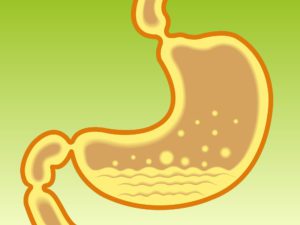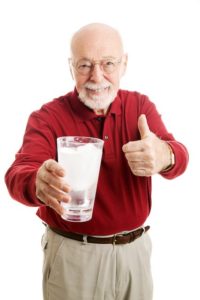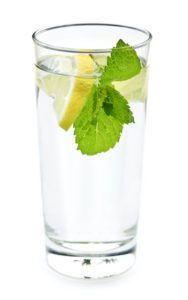Should You Be Drinking More Water?
Water makes up between 50 and 70 percent of the human body. This all depends of course on our age, physique, sex, and whether we are staying hydrated. We can go quite a while without food, but not without water per this the National Center for Biotechnology Information.
![]()
There are many symptoms you may feel that are associated with not having enough plain old water in your diet like, poor digestion, constipation, body stiffness, wrinkled skin, weight gain, hunger, fatigue, mental confusion, and more. Get this – water is the most common nutritional deficiency in the United States of America today! Water is the driving force of all nature.
Improved Digestion
Our stomachs break down our food using both a mechanical and chemical means. The chemical component requires that you are hydrated so it can make the necessary acidic solution. If you try to “hydrate” at meal time by drinking lots of water then you end up diluting those very necessary gastric juices making it much harder to digest your meal. Have you heard the “diet tip” to drink a glass of water before you eat your meal so you won’t eat as much? That will in fact make you fuller to start and you probably won’t eat as much, but you won’t digest it as well either.
Best thing to do is drink your water throughout the day and mostly between meals.
Limit your meal time water to what you need to cleanse your palate and enjoy your meal. There was a  USA Today article back in August of 2020 stating that there is no proof that drinking a lot of water with a meal impacts digestion. That’s because there are no studies to show one way or another. Check out my blog with a short video on how digestion works and doesn’t work. I think you’ll agree that it makes sense to hydrate away from meals to support digestion.
USA Today article back in August of 2020 stating that there is no proof that drinking a lot of water with a meal impacts digestion. That’s because there are no studies to show one way or another. Check out my blog with a short video on how digestion works and doesn’t work. I think you’ll agree that it makes sense to hydrate away from meals to support digestion.
Joints Move With More Ease
Water acts as a shock absorber in our joints. Approximately 60% of that joint cartilage is made from water. Have you heard of “synovial fluid”? It basically lubricates the joints and eases possible friction and reduces impact. Staying hydrated helps your body maintain healthy synovial fluid, cartilage, and therefore, healthier body movement. Another part of this is simply that when you are not properly hydrated, the body cannot remove waste efficiently. This can lead to a buildup of toxins that also lead to overall body stiffness. There are other factors as well that influence our joint health like inflammation, but drinking water is a great place to start.
Skin is More Supple
I am not saying that if you drink enough water, you won’t get wrinkles or that the ones you have will magically disappear. What I am saying is that if your skin suddenly starts to look more wrinkled than normal, check out your fluid intake. Water is a primary component of our skin AND our skin is our largest organ. Keeping you hydrated will help keep your skin nourished. Eating and assimilating sufficient healthy fats is also very good for your skin. I personally have nothing against wrinkles because it is part of aging and I’ll take that over the alternative! That’s another story for another time.
Easier Weight Loss
One of the early signs of not having enough water is a feeling of hunger. It’s just what it may feel like, but really, you are not hungry at all. You are simply thirsty. Try this the next time you get the thought in your head that you are hungry, but at the same time you think to yourself, “I shouldn’t be hungry yet”. Get up and get a tall glass of water, put something fun like lemon, cucumber, lime or some herbs in it and enjoy. Give it 5 minutes and see if you are still hungry. Just implementing this can bring on weight loss because you can skip those snacks throughout the day.
Mental Clarity & Increased Energy
Another sign of becoming dehydrated is that feeling of “fuzzy brained” or “fatigued”. This is an overall need for enough water to keep our cellular ![]() communications functioning properly. You may not realize it, but our cells communicate with each other all the time through their membranes. If they are shriveled up like raisins instead of plump like grapes then they just don’t work as well. When we can’t send and receive signals easily, we can become fatigued and sluggish. If you are feeling sleepy during the day and taking a nap isn’t what you are after, then grab a tall glass of H2O. I think you will be pleasantly surprised at how a little water can help you feel re-energized. This is not an easy task for the everyone and especially the elderly or disabled because they don’t want to have to urinate all the time plus they simply forget to drink.
communications functioning properly. You may not realize it, but our cells communicate with each other all the time through their membranes. If they are shriveled up like raisins instead of plump like grapes then they just don’t work as well. When we can’t send and receive signals easily, we can become fatigued and sluggish. If you are feeling sleepy during the day and taking a nap isn’t what you are after, then grab a tall glass of H2O. I think you will be pleasantly surprised at how a little water can help you feel re-energized. This is not an easy task for the everyone and especially the elderly or disabled because they don’t want to have to urinate all the time plus they simply forget to drink.

Sadly, studies show that an increasing number of our seniors are finding their way to the emergency room because they are dehydrated. This is completely avoidable with some awareness and support. A primary sign of this is loss of balance and confusion.
With all this said, it seems pretty clear that staying properly hydrated is a good thing. You get better digestion, better joint function, healthier skin, you won’t need to snack as much, and you avoid the fatigue and brain fog associated with slight dehydrations.
How Much Water Should I be Drinking?
On average our youth drank an average of 15 ounces of water per day and our adults drank an average of 39 ounces of water per day per a study in 2010 & 2014. We, as a nation, are doing better today because we have been slowly decreasing our intake of sweetened beverages and turning to more water, but it is still difficult to stay properly hydrated.
How much water is “enough”, you ask?
“Given the extreme variability in water needs that are not solely based on differences in metabolism, but also in environmental conditions and activity, there is not a single level of water intake that would ensure adequate hydration and optimal health for half of all apparently healthy persons in all environmental conditions.” ~ National Academy of Medicine.
My Recommendations on Water Intake
There may not be a magical number, however, I suggest around 64 ounces

or 2 liters per day as a good starting point. Most folks are drinking much less so this is a great goal and an opportunity to see if some of those nagging aches and pains go away. Maybe you’ll notice a little more pep in your step.
I also highly recommend starting each morning with a delicious fresh glass of water before any other coffee or tea! What a wonderful way to refresh your body and all its cells after a night of rest. Adding a wedge of lemon or lime is an added bonus. Over time, get creative with some added herbs. Room temperature or slightly warm water is best!
Increasing your water intake is a great opportunity to see if some of those nagging aches and pains go away. Maybe you will even notice a little more pep in your step.
Drinking water and staying hydrated is as gift to yourself that keeps giving.
Let me know whether you’ve been able to increase your water intake and what differences you find. I would also love to hear how much you are loving the morning lemon water. I’m quite confident that once you start the practice, you won’t want to stop.
I promise to share my my tips & tricks for remembering to drink water throughout the day in my next article.

[…] reading by last blog post about why water is so very important to you at a cellular level, you understand that drinking it […]
Hi Wilma,
Thank you for including me in your blog. I really need those reminders. A question, what should I know about selzer water? Is it good or bad?
Jerry
Hi Jerry,
Thanks for bringing seltzer water up. I like to see plain H2O as the majority of water intake throughout the day. Preferably, the seltzer water is plain or flavored with your own fruits and herbs. Having a sparkling water maker at home is very convenient and saves on all those single use cans / bottles if you are buying your sparkly water. The flavored fizzy waters, even though they say “natural”, should be kept to a minimum. I find it concerning that many folks talk about their addiction to flavored canned fizzy water…that is not natural.